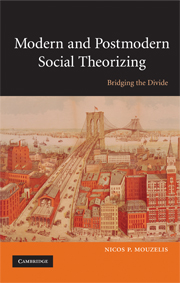Book contents
- Frontmatter
- Contents
- List of figures
- Acknowledgements
- Introduction
- Part I The theoretical background: the development of the agency–structure problematic
- Part II Parsonian and post-Parsonian developments
- Part III Agency and structure: reworking some basic conceptual tools
- Part IV Bridges between modern and late/postmodern theorizing
- 9 Modernity: a non-Eurocentric conceptualization
- 10 Ethical relativism: between scientism and cultural relativism
- 11 Cognitive relativism: between positivistic and relativistic thinking in the social sciences
- 12 Social causation: between social constructionism and critical realism
- Part V Towards a non-essentialist holism
- Instead of Conclusion: Twelve rules for the construction of an open-ended holistic paradigm
- Appendix: In defence of ‘grand’ historical sociology
- References
- Index
10 - Ethical relativism: between scientism and cultural relativism
Published online by Cambridge University Press: 05 June 2012
- Frontmatter
- Contents
- List of figures
- Acknowledgements
- Introduction
- Part I The theoretical background: the development of the agency–structure problematic
- Part II Parsonian and post-Parsonian developments
- Part III Agency and structure: reworking some basic conceptual tools
- Part IV Bridges between modern and late/postmodern theorizing
- 9 Modernity: a non-Eurocentric conceptualization
- 10 Ethical relativism: between scientism and cultural relativism
- 11 Cognitive relativism: between positivistic and relativistic thinking in the social sciences
- 12 Social causation: between social constructionism and critical realism
- Part V Towards a non-essentialist holism
- Instead of Conclusion: Twelve rules for the construction of an open-ended holistic paradigm
- Appendix: In defence of ‘grand’ historical sociology
- References
- Index
Summary
In the previous chapters I dealt with the type of relativism which denies that modernity entails features which, under globalized conditions, are transcultural rather than Western-specific. In this chapter I deal with a related issue: I critically assess attempts to overcome the relativism that communitarian theories often entail by the adoption of an anti-relativistic strategy different from my own. In order to make my arguments as clear and concrete as possible, I focus on a single work – Amitai Etzioni's The New Golden Rule (1996).
There are two standard critiques of communitarian theories: (i) that these theories always have authoritarian connotations, with their emphasis on the importance of communal values and order undermining individual freedoms; and (ii) that their focus on the context-bound nature of communal values results in the relativistic idea that, since every community has its own values, there is no supra-communal or extra-communal way of assessing conflicting views of the ‘good’ life.
The golden rule perspective
Communitarianism, as expounded by Etzioni (1996), attempts to overcome both the authoritarian and the relativistic critique. He responds to both with his notion of a ‘golden rule’ – the idea that when advocating or promoting ‘community’ in the modern world, one should strive to achieve a balance between order and individual autonomy. It is imbalance between these two cardinal virtues that creates difficulties: emphasis on order at the expense of autonomy leads to authoritarianism, while emphasis on autonomy at the expense of order leads to anarchy.
- Type
- Chapter
- Information
- Modern and Postmodern Social TheorizingBridging the Divide, pp. 164 - 174Publisher: Cambridge University PressPrint publication year: 2008

